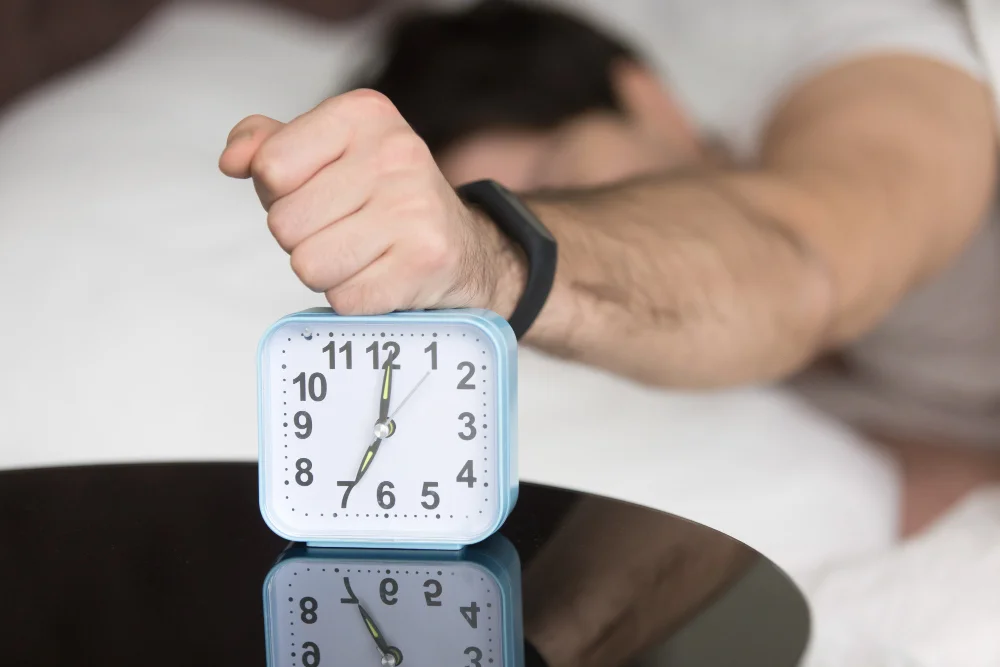Are you one of those people who struggle to wake up early in the morning? Do you find yourself hitting the snooze button multiple times and feeling groggy even after waking up? If yes, then you are not alone. Many people find it difficult to wake up early and feel fresh in the morning. However, the good news is that it is possible to train your body to wake up early and feel energized. In this article, we will discuss how to wake up early morning without feeling tired or groggy.
Why is it hard to wake up early in the morning?
Waking up early in the morning can be challenging for several reasons. First, our bodies have an internal clock that regulates our sleep-wake cycle, known as the circadian rhythm. If we disrupt this rhythm by staying up late or sleeping in, it can be harder to wake up early in the morning. (1)
Second, many people struggle with feeling tired or groggy in the morning because they aren’t getting enough quality sleep. Poor sleep quality can result from a variety of factors, including stress, anxiety, or sleep disorders such as sleep apnea.
Why waking up early is important?
Waking up early has numerous benefits for our physical and mental health. Studies show that early risers have a more positive outlook on life, are more productive, and have better mental and physical health. It also gives you more time to start your day and get things done.
How much sleep do you need?
The amount of sleep a person needs varies depending on their age and individual needs. However, most adults need between 7-9 hours of sleep per night to feel rested and alert in the morning (2).
How to Wake Up Early in the Morning: Tips and Tricks for Waking Up Early

Waking up early can be challenging, especially if you’re used to sleeping in. Here are some tips and tricks to help you wake up early:
1. Set a consistent sleep schedule
One of the most important steps to waking up early morning without feeling tired or groggy is to establish a consistent sleep schedule. This means going to bed and waking up at the same time every day, even on weekends.
This can help regulate your body’s internal clock and make it easier to fall asleep and wake up at the desired times.
2. Create a relaxing bedtime routine
Another technique for waking up early is to create a relaxing bedtime routine. This can include activities such as taking a warm bath, reading a book, or practicing meditation. By establishing a relaxing routine, you’ll signal to your body that it’s time to wind down and prepare for sleep.
3. Setting the Right Sleep Environment
Creating the right sleep environment is essential for getting a good night’s rest. Here are some tips for setting up your sleep environment to promote better sleep:
- Temperature control: Keeping the temperature in your bedroom between 60-67 degrees Fahrenheit (15-19 degrees celsius) can help you fall asleep faster and stay asleep longer. Make sure to use breathable sheets and blankets that can help regulate your body temperature throughout the night.
- Noise control: Noise can be a major disruption to your sleep. Consider using earplugs or a white noise machine to block out unwanted noise. You can also try using a fan or air purifier to create a constant, soothing background noise.
- Light control: Exposure to light can disrupt your sleep cycle. Make sure to keep your bedroom dark and use blackout curtains or shades to block out any external light. Avoid using electronic devices with bright screens before bedtime, and consider using a dim nightlight if you need to get up during the night.
4. Get Enough Sleep to Wake up Early Morning

Getting enough sleep is crucial to waking up early and feeling energized throughout the day. Aim for 7-8 hours of sleep each night and establish a consistent sleep schedule. This can help regulate your body’s internal clock and make it easier to wake up in the morning.
5. Wake Up Gradually
Avoid the temptation of hitting snooze and waking up gradually. This can include setting your alarm clock 10-15 minutes earlier each day, using a wake-up light, or placing your alarm clock across the room.
Gradually waking up can make the transition from sleep to wakefulness smoother and less abrupt.
6. Avoid Stimulants Before Bedtime
Avoid consuming stimulants like caffeine or nicotine before bedtime. These can interfere with your sleep and make it difficult to fall asleep. Also, avoid alcohol as it can disrupt your sleep cycle and make you feel groggy in the morning.
7. Get Enough Sunlight During the Day

Getting enough sunlight during the day can help regulate your sleep-wake cycle. Exposure to natural light can help reset your circadian rhythm and make it easier for you to fall asleep at night. You can go for a walk or sit outside in the sun for 30 minutes every day.
8. Limit Screen Time Before Bed
The blue light emitted by electronic devices can interfere with your body’s production of melatonin, a hormone that regulates sleep.
To ensure a good night’s sleep and make it easier to wake up early, it’s essential to limit your screen time before bed. Try to avoid using electronic devices for at least an hour before you plan to sleep.
9. Keep Your Bedroom Dark and Quiet
To create an optimal sleep environment, make sure your bedroom is dark and quiet. Use curtains or blinds to block out any light and use earplugs if you are sensitive to noise. Keep the temperature cool, as a cool room can help you sleep better.
11. Use an Alarm Clock
Using an alarm clock can help you wake up early morning without feeling tired or groggy. Set the alarm clock to wake you up at the same time every day. Avoid hitting the snooze button multiple times, as this can disrupt your sleep cycle.
11. Exercise in the morning

Exercising in the morning can help you feel more awake and alert throughout the day. Even a short workout or a brisk walk can make a difference in your energy levels.
12. Have a Healthy Breakfast
Having a healthy breakfast can give you energy and help you start your day on the right foot. Try to have a balanced breakfast that includes protein, whole grains, and fruits or vegetables.
13. Stay hydrated to Wake Up Early

Drinking enough water throughout the day can improve your overall health and energy levels. Try to drink a glass of water as soon as you wake up, and keep a water bottle with you throughout the day.
14. Avoide late-night snacks
Eating late-night snacks can interfere with your sleep and make it harder to wake up early in the morning. It is recommended to avoid eating at least 2-3 hours before your bedtime.
The Benefits of Waking Up Early
Waking up early has several benefits for both physical and mental health. Here are some of the most notable benefits (4, 5, 6, 7, 8):
1. Increased productivity
When you wake up early, you have more time in the day to get things done. You can use this time to exercise, work on projects, or take care of tasks that you wouldn’t have time for later in the day. This can lead to increased productivity and a greater sense of accomplishment.
2. Improved mental health
Waking up early can also have a positive impact on mental health. Research has shown that people who wake up early tend to have lower levels of stress and anxiety. They may also be more optimistic and have a greater sense of well-being.
3. Better sleep quality
Going to bed and waking up at the same time every day can help regulate your sleep cycle. Waking up early can also help you get more sunlight exposure, which can improve your mood and help regulate your circadian rhythm.
4. More time for self-care
When you wake up early, you have more time for self-care activities such as meditation, yoga, or reading. These activities can help you start your day off on the right foot and reduce stress levels.
5. Healthier eating habits
People who wake up early tend to have better eating habits. They are more likely to eat breakfast, which can provide energy and improve metabolism. They may also be less likely to snack late at night, which can lead to weight gain.
Common Mistakes to Avoid While Waking up Early

Waking up early is a habit that can bring a lot of benefits, such as increased productivity, better mental health, and a more positive outlook on life. However, many people struggle to wake up early consistently, and often make mistakes that can sabotage their efforts. Here are some common mistakes to avoid while waking up early:
-
Going to bed too late: If you want to wake up early, you need to go to bed early. Staying up late will make it harder to wake up in the morning, and can disrupt your sleep cycle.
- Using your phone before bed: The blue light emitted by electronic devices can suppress the production of melatonin, a hormone that helps regulate sleep. Avoid using your phone or other electronic devices for at least an hour before bed.
- Hitting snooze: Hitting snooze may seem like a harmless habit, but it can actually make it harder to wake up in the morning. When you hit snooze, you disrupt your sleep cycle and can feel even more tired when you finally do wake up.
- Not having a morning routine: Having a morning routine can help you start your day on the right foot. Whether it’s meditation, exercise, or simply enjoying a cup of coffee, having a routine can help you feel more energized and focused throughout the day.
- Not getting enough sleep: Waking up early won’t do you any good if you’re not getting enough sleep. Aim for at least 7-8 hours of sleep each night to feel rested and alert in the morning.
-
Drinking caffeine too late in the day: Caffeine can interfere with your sleep cycle, so it’s important to avoid drinking coffee or other caffeinated beverages too late in the day.
Read More: Top 10 Herbal Remedies for Frequent Urination at Night in Females
Read more- How to Stop Cough at Night: 12 Best Home Remedies
See more- Quick and Easy Ways to Eliminate Bitter Taste in Your Mouth
When to Seek Medical Advice
If you are having difficulty waking up early in the morning despite your best efforts, it may be a good idea to see a doctor. This is especially true if you are experiencing other symptoms such as fatigue, difficulty concentrating, or insomnia, as these can be signs of an underlying medical condition.
A doctor can help identify any underlying medical conditions that may be contributing to your difficulty waking up early and recommend appropriate treatment options. They may also refer you to a sleep specialist or recommend sleep studies to further investigate any sleep disorders.
Conclusion
Waking up early in the morning without feeling tired or groggy can be achieved by establishing healthy sleep habits and creating a consistent routine. This includes going to bed and waking up at the same time every day, creating a relaxing sleep environment, avoiding caffeine and alcohol before bed, and practicing relaxation techniques.
Additionally, it can be helpful to establish a morning routine that includes physical activity, exposure to natural light, and a healthy breakfast. By making these adjustments and sticking to a regular sleep schedule, you can train your body to wake up feeling refreshed and energized each morning.
It’s important to keep in mind that every individual’s body is unique, and what may be effective for one person might not be for another. Therefore, it’s essential to explore and try out various techniques and strategies to discover what works best for you. By maintaining consistency and determination, waking up early can become a healthy habit that contributes to your overall well-being.
Remember, it may take some time for your body to adjust, so be patient and consistent in your efforts. If these methods don’t work, you may want to consult with a healthcare professional.
FAQs (Frequently asked questions)
Q. How many hours of sleep do I need?
Ans. The amount of sleep you need can vary depending on factors such as age, activity level, and overall health. However, in general, most adults require between 7-9 hours of sleep per night to function at their best. Teenagers may need up to 10 hours of sleep, while younger children and infants may require even more.
Q. What can I do if I can’t fall asleep at night?
Ans. There are several things you can try if you’re having trouble falling asleep at night. Some strategies include establishing a consistent bedtime routine, creating a relaxing sleep environment, avoiding caffeine and alcohol before bed, and practicing relaxation techniques such as deep breathing or meditation.
Q. Is it okay to nap during the day if I wake up early?
Ans. Napping during the day can be a helpful way to catch up on missed sleep, especially if you woke up earlier than usual. However, it’s important to keep naps short (no more than 30 minutes) and to avoid napping too late in the day, as this can interfere with nighttime sleep.
Q. How long does it take to adjust to a new sleep schedule?
Ans. It can take several days to a few weeks to adjust to a new sleep schedule, depending on how drastic the change is. To help your body adapt more quickly, try gradually shifting your bedtime and wake time by 15-30 minutes each day until you reach your desired schedule.
Q. What are some good habits to establish before bedtime?
Ans. Establishing a consistent bedtime routine can help signal to your body that it’s time to wind down and prepare for sleep. Some good habits to incorporate into your routine include turning off electronic devices at least an hour before bed, taking a warm bath or shower, practicing relaxation techniques, and reading a book.
Disclaimer : The above information is given purely from educational point of view. This information should not be used for diagnosis or treatment of any disease without professional medical advice. Never ignore professional medical advice in seeking treatment because of something you have read on the webpostguru site. Apart from this, before adding or removing anything in your diet, please consult a qualified doctor or dietitian. If you think you may have a medical emergency, immediately call your doctor.
